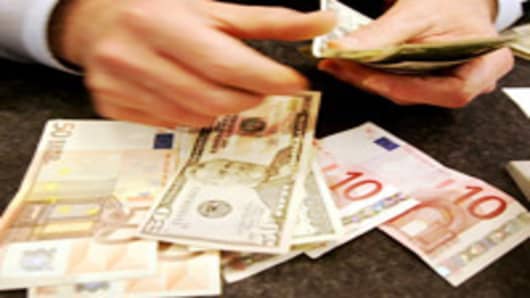No longer. Traders around the world are pounding the dollar (and its negative real rates of return in the bond market) as the latest leg of the financial crisis consumes Ben Bernanke's attention and the fundamental picture of the US economy continues to weaken.
Now, I've not personally seen the Fed Chief's iPod, but if "Free Ride" is on his playlist, I'm sure he hums along to this portion of the song:
"all over the country I've seen it the same/ nobody's winning at this kind of game/ we've got to do better it's time to begin/ you know all the answers must come from within"
This was the central thesis of his two-day testimony to lawmakers on Capitol Hill this week: "I think the dollar in the long term depends really on the fundamentals, and it's up to us to get fundamentals right.''
But I'd counsel optimistically hawkish Fed Chairman to listen more closely to the poetic third stanza as the dollar continues to print new lows against the euro.
"The mountain is high/ The valley is low/ and you're confused on which way to go/ so I've come here to give you a hand/ and lead you into the promised land"
What does this mean? Dollar intervention, that's what it means, and it has to come soon.
Don't snicker – these are times unlike any other for the world's largest economy, 70 percent of which is fueled by consumer spending. Those consumers are getting thumped by record high gas prices, crumbling house values and rising unemployment. Investors are getting stung by free-falling equities. Foreign holders of US treasury paper are living (for the moment, at least) with negative returns.
Analysts at Morgan Stanley have mocked-up an intervention model which looks at, among other things, the market mis-pricing of economic growth outlooks, any significant deviation of the real exchange rate from historical trend and excessive market positioning. They peg the probability of intervention at 30 percent.
I think it should be higher.
A quick, decisive, Fed-led program of dollar purchasing would solve many of these issues: it would stabilize the currency and re-set levels for the 40-plus nations pegged against it. It would bring oil prices down by an estimated 20 to 30 percent, immediately eroding the headline impact of inflation for both the US and (critically) other G-7 economies. It would flatten the Treasury yield curve and help the central bank ease inflation expectations. It would, according to Hans Redeker of BNP Paribas, strip away the inflation premium in the long-end of the bond market and would also prime the pump of corporate earnings growth for the second half of this year and beyond.
Critics say the move would smack of desperation (like bail-outs for Bear Stearns and credit life-lines for Fannie Mae and Freddie Mac are somehow signs of strength) and instead put even further pressure on the greenback.
Others suggest the US economy is benefiting too much from a weaker dollar, which is true: exports are cheaper, overseas revenues for American corporates are rising and earnings are getting support as a result.
But export growth isn't consistent with job growth, and Bernanke, Treasury Secretary Hank Paulson and (ultimately) President George W. Bush will probably look at rising unemployment and decide to take their chances with slower export growth abroad if it leads to more jobs at home. Especially in an election year.
"Market intervention is a policy that's been undertaken a few times," Bernanke told Congress. "I think it's something that should be done only rarely. But there may be conditions where markets are disorderly, where some temporary action might be justified."
Dollar intervention could also be spun positively (hey, those pesky speculators in the oil market, and their hoarding OPEC buddies, gave us no choice) and will likely get more political support that the current fixation with back-stopping the stupid bets Wall Street made on the housing sector.
Besides, are Americans really going to care *what* the reason is when their gas prices tumble from the now $4.11 a gallon average (which is 40 percent higher than it was on New Year's Day)? Probably not.
Mind you, the Fed's balance sheet, already lumbered with billions of the Street's, shall we say, less-than-marketable securities as part of its clean-up effort, doesn't have the strength to go-it-alone in the trillion dollar a day currency markets. It needs help – and it has to come from Europe and Japan.
European Central Bank President Jean-Claude Trichet would certainly like the immediate impact of intervention on oil prices – and the year-on-year implications for headline consumer prices. However, the resultant euro weakness would, in fact, increase commodity import price implications for the euro zone economy, although it would boost exports. Although Friday's trade balance figures from the month of May – a 4.6 billion euro deficit following a surprise April surplus – will surely color Monsieur Trichet's thinking.
Bank of Japan Governor Masaaki Shirakawa, however, is likely to recall his nation's attempts to devalue the yen in 2003 – a $350 billion effort that ultimately failed. Both men might need convincing.
Okay, so it might not be the easiest play to execute. And it might not be the cheapest. And it might not be the most dignified.
But it just might work.


